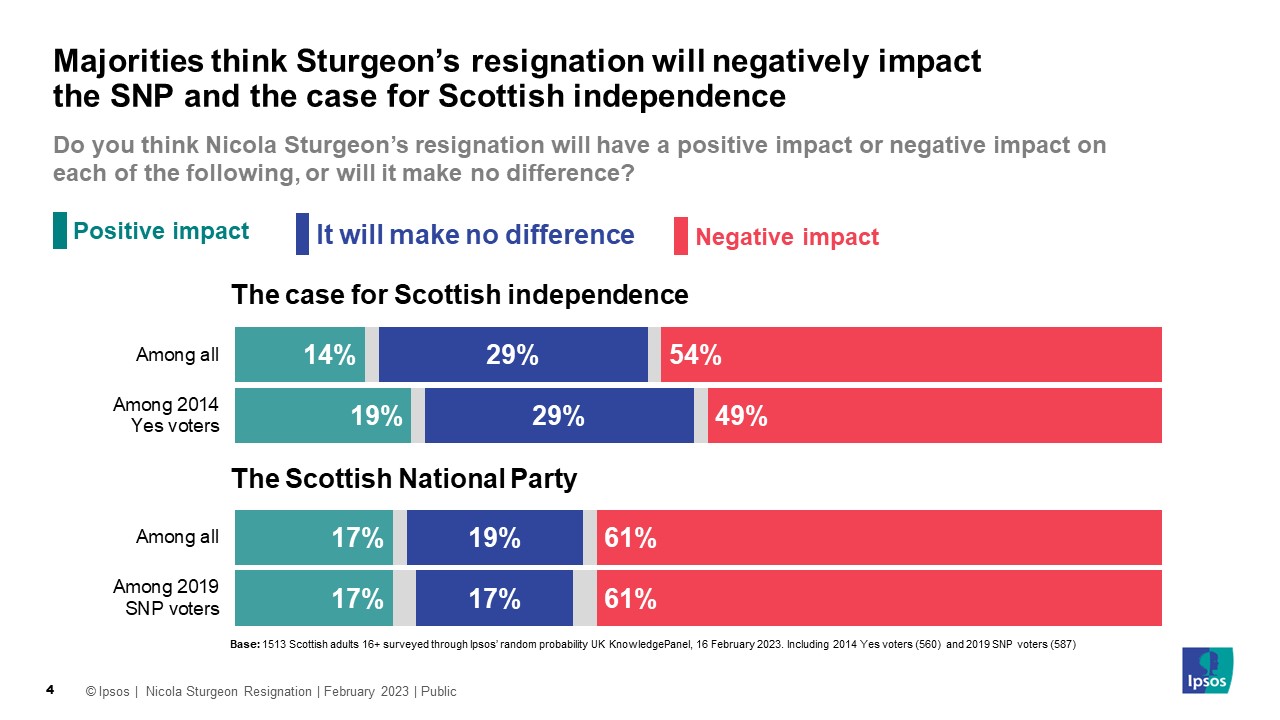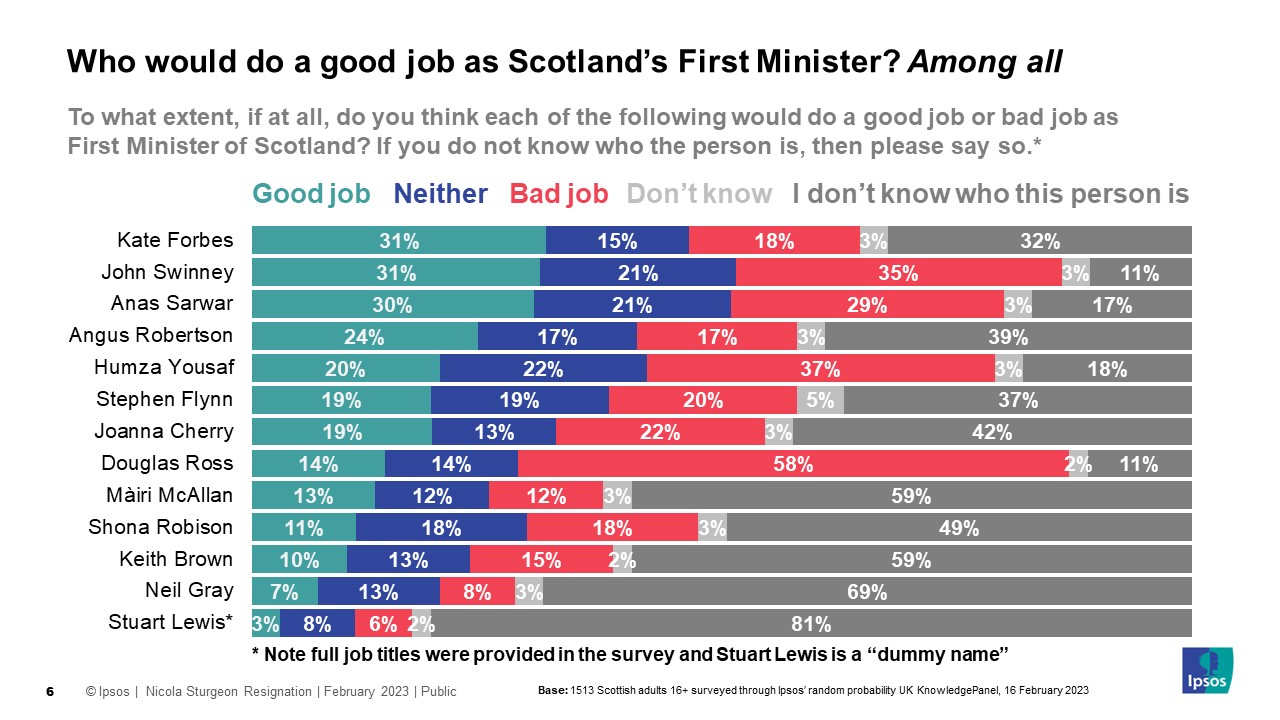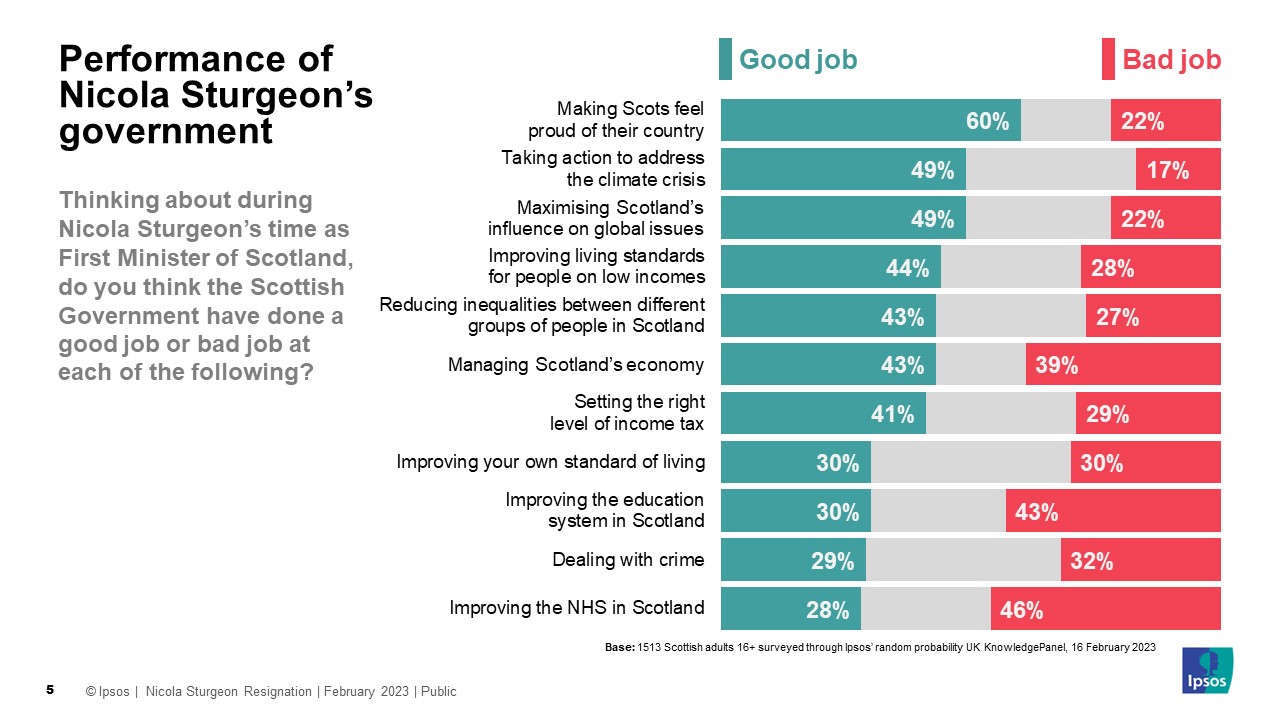Over half of Scots think Nicola Sturgeon’s resignation damages case for independence
New polling conducted the day after Nicola Sturgeon’s resignation, finds that:
- Three in five of the Scottish public (59%) say that Nicola Sturgeon has changed Scotland for the better.
- A majority of the public think that her resignation will have a negative impact both on the case for Scottish independence and on the SNP.
- Kate Forbes leads the contenders for her successor among those who have not ruled themselves out of the race, although one in three of the public don’t know who she is.
Impact of Nicola Sturgeon’s resignation
Over half of the public (54%) say that Nicola Sturgeon’s resignation will have a negative impact on the case for Scottish independence. The same is true among SNP 2019 voters (51%).
Three in five (61%) say that her resignation will have a negative impact on the SNP, while just 19% say it will have a positive impact. The pattern is similar among 2019 SNP voters, with 61% thinking her resignation will have a negative impact on the party and 17% that it will have a positive impact.

Was Nicola Sturgeon right to resign?
Seven in ten Scots (69%) think the First Minister made the right decision to resign. One in four (26%) believe it was the wrong decision. Among 2019 SNP voters, over half (55%) say it was the right decision, against two in five (40%) who think the opposite.
Potential contenders for Scottish First Minister
When asked how a list of possible contenders might perform as First Minister, Kate Forbes leads those who have not ruled themselves out of the race with three in ten (31%) believing she would do a good job, against one in five (18%) thinking she’d do a bad job. However, a third (32%) say they don’t know who she is. She maintains her lead among 2019 SNP voters, 44% of whom think she would do a good job.
John Swinney, who has since declared he will not stand in the race, vied Forbes for top spot with a third thinking he would do a good job (31%), while slightly more say he would do a bad job (35%). He polled the highest of any potential candidate among 2019 SNP voters, with 47% thinking he’d do a good job as First Minister.
Following Forbes in the race are Angus Robertson (24% good job, 17% bad job, 39% unaware of him) and Humza Yousaf (20% good job, 37% bad job, 18% unaware). Narrowly behind them are Joanna Cherry, who has since said she will not run (19% good job, 22% bad job, 42% unaware) and Stephen Flynn, who has also ruled himself out of the race (19% good job, 20% bad job, 37% unaware). Everyone else polled received fewer than one in five believing they would do a good job.
Meanwhile, opinion is split on Scottish Labour leader Anas Sarwar who three in ten think would do a good job (30%) but a similar proportion say a bad job (29%). Sentiment is more decisive on Scottish Conservative leader Douglas Ross, who three in five (58%) think would do a bad job, against 14% believing he would do a good job.

Nicola Sturgeon’s performance as First Minister
Reflecting on Nicola Sturgeon’s time as First Minister, three in five believe she has changed Scotland for the better (59%), against a third who say for the worse (31%). Fewer than one in ten (8%) think she has made no difference.
During her time as leader, three in five (60%) say the Scottish Government have done a good job making Scots feel proud of their country. Over two in five say it has also performed well taking action to address the climate crisis (49%), maximising Scotland’s influence on the global issues (49%), improving living standards for people on low incomes (44%), reducing inequalities between different groups of people in Scotland (41%) and setting the right level of income tax (41%).
Opinion is more divided on how the Scottish Government has managed Scotland’s economy (43% good job, 39% bad job), improved people’s own standard of living (30% good job, 30% bad job) and dealt with crime (29% good job, 32% bad job).
Her government receives its most negative ratings for improving the NHS and education system in Scotland where just over two in five say it has done a bad job on both (46% and 43% respectively).

Emily Gray, Managing Director of Ipsos in Scotland, said:
These new results taken the day after Nicola Sturgeon’s resignation underline that her successor faces a hefty in-tray, with the public critical of Scottish Government performance on the NHS and education in particular. Although Kate Forbes emerges as the preferred choice among the possible contenders as First Minister, followed by Angus Robertson, name recognition for both of them is currently limited. Three in ten of the public say they don’t know who Kate Forbes is and four in ten say the same of Angus Robertson.
Technical note
This data has been collected by Ipsos’s UK KnowledgePanel, a random probability panel which provides gold standard insights into the UK population, by providing bigger samples sizes via the most rigorous research methods.
Ipsos interviewed a representative sample of 1,513 adults aged 16+ in the Scotland. Interviews were conducted online on 16 February 2023.
Data are weighted to match the profile of the population. All polls are subject to a wide range of potential sources of error.




